
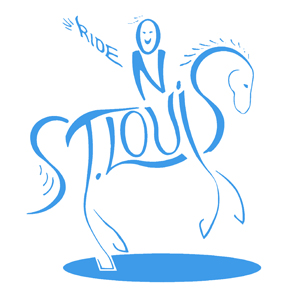
Ride On St. Louis, Inc.
9000 Grab Ln
HILLSBORO, MO 63050
Mailing Address:
PO Box 94
KIMMSWICK, MO 63053
Phone: 636-464-3408
MAKE AN INQUIRY
View our WEBSITE
EIN: 43-1885666Founded: 1998
View our PHOTO GALLERY
Profile Last Updated December 23, 2025Public Charity
Click here to view listing(s) of the program horses we are seeking

The Guardian Seal of Transparency is awarded annually to recognize an organization's commitment to transparency and accountability by their willingness to make comprehensive data about their programs, horse care practices, and governance available for public scrutiny. The Guardian Seal of Transparency is NOT an endorsement.
Last Updated: August 20, 2025
Ride On St. Louis, Inc. has not attained the Guardian designation for 2026.
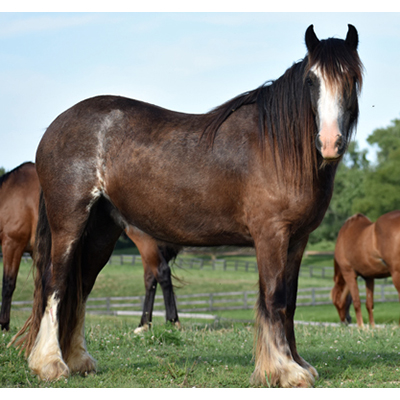
MISSION & PROGRAMS
Mission:Ride On St. Louis promotes health and enriches lives through love, joy and holistic healing. Our credentialed staff have met rigorous criteria and standards of practice in the field, demonstrating a deep understanding of disabilities, equines, teaching methodologies and human-animal interactions, to provide equestrian instruction and therapeutic value to people, by ethically partnering with specifically selected and conditioned equine athletes and companions. Our programs focus on facilitating function, integration, and or increasing overall wellness to benefit people with mild to medically complex health challenges, and ensure the optimal wellbeing of the equines in our care and service.
Our organization conducts Equine Assisted Services in accordance with the EQUUS Foundation Guidelines on Qualifications of Organizations Conducting Equine Assisted Services (EAS).
Our organization provides outreach and/or public education programs involving horses.
100% of our total programs and services are equine-related.
Our organization is directly responsible for the care and shelter of equines involved in our programs.
Our organization does not CURRENTLY use satellite, overflow, foster, and/or outreach facilities.
Please describe what steps your organization takes to ensure that:
1) all interactions between your equines and people are mutually beneficial and conducted in accordance with the Guidelines for Human-Equine Interactions stated below;
2) all equines in the care of our organization and/or equines that participate in the organization's program have access to clean drinking water at all times; nutritious food in sufficient quantity, including natural forage such as pasture grass and/or hay; appropriate veterinary, farrier, and dental care; shelter and protection from the weather; sufficient safe space to move around comfortably on a daily basis; and daily opportunity to freely interact and have contact with other equines:
At Ride On St. Louis, our horses are highly valued sentient partners. Their physical, mental, and emotional well-being is central to every programmatic decision, and their comfort and enjoyment in equine-assisted services is of utmost importance to our center and all involved. We develop and maintain top-quality horses who thrive in their personal lives and engage in programs and activities they enjoy and are suited to, which is essential to mutually beneficial human-equine interactions.
Our staff equine professionals are formally trained individuals with responsibilities that may include daily health and husbandry care, conditioning and training, session handling, staff/volunteer training, and oversight of all safety and welfare measures concerning equine participation. We designed our Forever Home to reduce stress for horses and enhance their comfort, safety, and freedom of behavior and movement. Our stabling layout promotes increased airflow, reduces dust accumulation, and allows each horse to see not only their herd mates but all activity within the barn, reducing isolation and enhancing their sense of security. Stalls outfitted with automatic waterers, individual fans for additional cooling, and mounted scratching brushes to encourage natural behaviors. The property’s layout supports effective pest control and includes thoughtfully installed fencing to provide both secure containment and access to varied, natural turnout. Horses enjoy 11+ acres of grass pasture to move freely walking up and down gentle hills, seeking shade under tree lines, accessing water and shelter as needed, and benefiting from airflow and mounted fans for fly control and temperature regulation. These features work together to promote balanced physical health, mental well-being, and daily opportunities for choice and comfort.
To ensure that human-equine interactions are respectful and never forced, Ride On St. Louis follows a structured, horse-centered process. New equine candidates undergo a thorough evaluation process, including verbal, written, hands-on and practical assessments to determine their suitability for inclusion at Ride On St. Louis. Evaluations cover a wide range of characteristics including health, conformation, gaits, demeanor, personality, history, reliability, temperament, and willingness, in addition to behavioral adaptability and the potential or ability to physically and mentally condition.
All prospective horses must also undergo a veterinary pre-purchase exam before entering an initial trial period. During this trial, horses are exclusively handled by no more than two staff trainers, who develop an individualized training and acclimation plan. Horses are slowly and freely introduced to potential stimuli they may encounter during sessions including mobility aids, adaptive tack, props, sidewalkers, and mounting aids—using rewards-based positive reinforcement and behavior shaping methods. Training sessions are customized to each horse and range from 1 to 45 minutes. No horse is rushed; no agenda is dictated; progress is always determined by the horse's behavior, comfort, and readiness. In all conditioning and service contexts, we remain vigilant against signs of learned helplessness. Our approach encourages horses to express both comfort and discomfort freely, participate voluntarily, and make choices throughout their routines. This not only supports psychological well-being but ensures that their willingness to engage remains a true indicator of their comfort, not a conditioned suppression of stress responses.
Equine specialists continuously assess each horse’s willingness, engagement, and physiological responses, forming a deeper understanding of their specific preferences, boundaries, and strengths. Once acclimated, a horse may begin interacting with one or two carefully selected clients during a control period. The specialist remains the horse’s dedicated handler and observer monitoring for both desirable signs (e.g., licking, chewing, relaxed posture, attentiveness, soundness) and early indicators of discomfort (e.g., agitation, bracing, tail swishing, hollowness, grimacing, depression, uneven sweat marks). We use various observation tools incorporating information found on the Equine Discomfort Ethogram and Ridden Horse Pain Ethogram, to assess and document well-being. Any signs of stress or pain trigger immediate reevaluation, intervention, and or removal from service.
Horses are never placed into back-to-back sessions, and all activities follow a "prevention-before-pain" policy. If adjustments are needed, we promptly evaluate tack, volunteers, clients, schedules, and even environmental stimuli. Veterinary, chiropractic, dental, and other care providers are engaged as needed. Horses that do not demonstrate fulfillment or suitability for services are respectfully discharged during trial, may transition into our Always Home retirement program where they remain in our full-time care, or in rare circumstances, are placed into appropriate homes where they may excel in other appropriate disciplines, activities, or lifestyles with knowledgeable equestrians.
Our horses are carefully paired with clients and scheduled based on their unique physical and emotional needs, ensuring all programming reflects a balance between horse and human. Each horse’s participation is continuously monitored by staff, and any contraindications to continued service (physical, emotional, or behavioral) undergo prompt collaborative discussion among our equine specialists and program leaders. We routinely ask, “What is the horse gaining through this interaction?” and make program decisions that prioritize their well-being and autonomy.
Ride On St. Louis horses thrive when routines are reliable, boundaries are respected, and their needs are prioritized. Our herd is managed by senior staff who have formal backgrounds, professional experience, and ongoing continuing education. Ancillary caretaking staff undergo one-on-one instruction and ongoing evaluation, and follow detailed protocols on water access, feeding, turnout, environmental safety, injury identification, blanketing or fly-wear, and emergency response. Staff complete daily checklists and logbooks that document horse-specific diets and care details. Clean water is available at all times with large auto-fill stall waterers or manually cleaned troughs cleaned and filled daily. In addition to pasture grazing, horses receive individually fed in designated stalls, feed, forage, and supplements, in accordance with their dietary needs. Pastures and paddocks are rotated and maintained (manure removal, weeding and overseeding) to ensure safe, spacious environments for free movement, social interaction, and natural foraging. Horses receive ample daily turnout as a herd and are stalled individually overnight. Horses are not stalled for extended periods unless medically necessary or in the event of a major emergency situation.
All horses have access to shelter in assigned stalls (nightly or in inclement weather) or outdoors via a large barn extension, and weather protection is provided based on seasonal and medical needs. Farrier, veterinary, and dental services are scheduled routinely for wellness and preventive care. Our future facility goals include building a new operations storehouse and completing footing for an arena. Each element is designed with equine comfort and safety in mind.
We recognize that human-equine activities have the potential to exert unwanted or unintended effects on the welfare of horses. Our equine-centered philosophy embraces evidence-based practice, continuing education, and adaptation. Specialists and leadership staff regularly monitor and update curriculum and care protocols to reflect best practices. Ride On St. Louis applies the internationally recognized Five Freedoms of animal welfare, while also acknowledging and acting upon more current models that reflect the complexity of equine emotional, social, and environmental needs. Our horses remain in the program for as long or as little as suits them, and always receive the highest respect and care in every career stage—trial candidate, in-service, or retired.
While the typical length of service for horses in equine-assisted services has been cited between 5 to 10 years, depending on age at intake, program type, and individual health or behavior, Ride On St. Louis horses routinely exceed this expectation. Through our thoughtful evaluation process, individualized plans, activity management, and commitment to physical and emotional well-being, many of our equine partners have happily and healthfully served at the upper end or beyond these average timelines. Several of our horses have contributed to programs for more than 12 to 20 years, a testament to the respectful, horse-centered approach we employ. We actively seek to ensure that their lives are fully enriched with appropriate physical, cognitive, and social stimulation, not only supporting the longevity of their service but aligning with species-specific welfare standards.
Ride On St. Louis maintains policies on equine selection, health and behavior monitoring, opt-out or discharge procedures, safety, emergency response, training and individual program alignment. Our staff are empowered to remove horses from participation at any time, and programming is developed to minimize environmental and physical stress. Our model is deliberate, responsive, and compassionate, because we believe the best outcomes for people come only through genuine, respectful partnership with the horses who serve them.
Equine Assisted Services (EAS) Overview:
Overview of our programs involved with providing EAS to individuals with special needs:
Unmounted Activities with Barn Buddies - A skills program providing in-depth equine education, hands-on application and accountability for people with disabilities, health-related obstacles or hardships. The program focuses on skills inherent to the equine industry and includes study and performance in husbandry, handling, grooming, sanitation management, first aid, record keeping and team management skills. The goal of the program is to address, relate, and achieve personal goals relevant to skill development, accident/injury recovery and coping, and or wellness improvements, while producing confident individuals knowledgeable in equine care who can assist with daily equine requirements at Ride On St. Louis. Typical applicants are adults who have or have had professional job experience and are struggling to return to that job or meet current job demands; those who are developing or regaining vocational skills; those who can perform barn chores unattended (clients remain under direct supervision with staff until individually defined levels of competence are achieved); and those who are able to drive themselves to the site. Instruction is generally one-to-one, but may include on occasion a small group of up to three. Current clients have diagnoses of: alcoholism, cancer, depression, and suicidal ideation.
Unmounted Activities with Sports Horsemanship - Clients engage in activities that support comprehensive care and handling of equines and equine activities that are necessary and useful regarding safety procedures, horsemanship and care of equine interaction. Participants train to be equestrians to the best of abilities. Lessons address equine behavior, anatomy, communication, grooming, equipment, physical and mental health, handling and overall basic horsemanship, to gain fundamental knowledge of the equestrian world for individuals who otherwise would not be able to participate in equestrian activities/instruction. Typical clientele include adolescents through seniors with mild to moderate health conditions and diagnoses. Current clients have diagnoses including vision impairment, hearing impairment, and cerebral palsy.
Unmounted Activities with Pony Bird - Ride On St. Louis is enhancing connectedness for both at-risk people with disabilities and their caregivers. The program is proud to partner with Pony Bird, a 24-hour residential facility for people who are non-ambulatory and have medically complex disabilities. Ride On St. Louis's program aims to prevent adverse health risks associated with loneliness and isolation, fosters togetherness, enhances social life by providing opportunity for communication, self-discovery, and revitalization of the mind and body through the senses; and boosts caregiver morale, attitude and connectedness. Current clients include caregivers and people who are non-ambulatory with co-occurring diagnoses including but not limited to: aggressive behaviors, Angelman syndrome, asthma, bone fractures, cerebral palsy, cerebrovascular anomaly, chronic hypoxemic respiratory failure, chronic venous insufficiency, cirrhosis, coarctation aorta, convulsions NEC (not elsewhere classified), degenerative joint disease, dementia, depression, disorder of infancy NOS (not otherwise specified), dysphagia, encephalitis, Gitelman syndrome, hearing impairment, hypersensitivity condition, hypothyroidism, incontinence, kyphoscoliosis idiopathic, major depressive disorder, mixed receptive expressive language disorder, neurofibromatosis, neuropathic pain, non-ambulatory, nonspeaking or nonverbal autism, obsessive-compulsive disorder, osteoarthritis, osteoporosis, other reduction deformities of the brain, paresis of the legs, patent ductus arteriosus, pruritus hiemalis, pseudobulbar palsy, psychogenis emesis, psychotic depression, renal insufficiency, seizure disorder, scoliosis, spasmodic torticollis, spasticity, spinal meningitis, stroke, static encephalopathy, and vision impairment.
Comment: During the relocation of our center due to recurrent flooding, and phases of improvement to our new facility, the Ride On St. Louis Board of Directors has strategically reduced services and or programs, in general, to allow staff who have multiple duties and roles in development, fundraising, equine and program delivery, the time required to plan and implement a major capital campaign, as well as to phase out equines eligible for retirement. While our new location reflects growth opportunities, we recognize the need for gradual, strategic implementation to ensure long-term success. As we transition horses and programs in 2025, we continue to assess and adapt to the property’s unique logistics, refine operational procedures, and address evolving community needs through program development. By carefully phasing in programs, emphasizing equine welfare, and addressing foundational needs like staff and infrastructure, we are poised for sustainable service and far-reaching success for years to come.
Equine Assisted Services (EAS) and Providers:
Our organization provides the following Equine Assisted Services (EAS):
Adaptive/Therapeutic Unmounted Horsemanship
1: Total number of Equine Assisted Service Providers at Ride On St. Louis, Forever Home
1 Marita Wassman, ATRI, CTRI
FACILITY PARTICIPATION:
Ride On St. Louis, Forever Home
RELATIONSHIP: Employee
SERVICES PROVIDED:
Adaptive/Therapeutic Unmounted Horsemanship
DEGREES, LICENSES AND/OR CERTIFICATIONS
Marita Wassman is CEO, co-founder, and Credentialed Advanced Therapeutic Riding Instructor through the Professional Association of Therapeutic Horsemanship International (PATH). Wassman is also a PATH Mentor and oversees equine management at Ride On St. Louis. She has 39 years’ experience in equine-assisted services and 45 years’ experience in a variety of equestrian enterprises. Wassman trained and worked with top equestrian professionals such as Liz Young Millard of the ’68 U.S. Olympic Equestrian team, Otis Brown Stables, Pecan Tree stables, and LePere Thoroughbred Training Center. These equestrian facilities included disciplines in hunter/jumper, dressage, and breezing thoroughbreds; she gained knowledge in breeding, foaling, training, exercising, and designing youth and adult riding programs for typically developing individuals and those with special needs. Marita oversees the agency’s performance and goals, leading financial, fundraising, and programming, personnel, strategic planning, long-term visioning, and community relations in support of the mission and founding values. Wassman is a member of the American Hippotherapy Association and PATH International, and certified as an Applied Whole Horse Hoof-Care trimmer.
Outreach and/or Public Education:
Ride On St. Louis has relationships through research efforts, programming, education and outreach program partnerships with the exceptional institutions of Washington University School of Medicine Program in Occupational Therapy, Variety the Children's Charity of St. Louis, Research Center for Human Animal Interaction, Mizzou College of Veterinary Medicine, St. Margaret Mary Alacoque Parish and School, St. Pius X Highschool, Maryville University, St. Louis University, Pony Bird residential care facility, and other organized groups. Staff and equine ambassadors present topics of equine-assisted services through on-site tours, volunteer/community service programs, and off-site visits to schools, businesses, community events and other institutes to educate, bring awareness to, and inspire passions for horses, equine-assisted services, and helping others.
Ride On St. Louis is a hosting site for a local parish school immersive faith and service activity. Through this collaboration Ride On St. Louis gives students preparing for their confirmation in the Catholic Church an important opportunity to engage in their community through learning, volunteering and discovery of new experiences. All youth have strengths and can contribute positively. Their time at Ride On St. Louis engages students emotionally, cognitively, and physically and inspires them to seek out projects and causes they are passionate about at this important life-stage. Through our participation we foster positive youth development to involve young people within their communities, schools, organizations, peer groups, and families in a manner that recognizes, utilizes, and enhances youths’ strengths. This outreach promotes positive outcomes by providing opportunities, fostering positive relationships, and adding to the support needed to build on character, values, and moral formation.
We continue outreach with long-standing partner Pony Bird--a residential group home serving adults with medically complex diagnoses. This outreach provided Pony Bird day-program participants an outlet to exercise inclusive volunteer opportunities. Our partners have expressed that sometimes people with disabilities do not have as many options to volunteer in the community as they would like. Ride On St. Louis values volunteering and doing good for others as an important part of community life. Our inclusive volunteer opportunities ensures that everyone and all abilities, can give back and be a key part of civic engagement across the community. Our Pony Bird volunteers visit weekly, weather permitting, to build confidence, accountability, job skills, work experience, and to give back in a fun and supportive equine atmosphere. Participants work on communication, sequencing, developing new relationships and friendships, learning new skills, being responsible for logging in/out, and assisting in keeping a professional barn in good working order. Volunteers have picked up sticks, learned to use a wheel barrow, learned about different grooming brushes and how to clean them, washed tools and equipment, practiced writing their names and logging times, dates and hours, and even learned a little about "what makes a horse happy" (e.g. freedom to express behavior and have needs met, best practices for interacting with, etc.). People can and should be enabled to contribute to their communities. And when we can all participate, it’s a win-win.
Ride On St. Louis offers volunteer opportunities for all ages and abilities, for individuals, groups, scout troops, businesses, etc. Other specific volunteer activities may include academic students volunteering to fulfill community service projects, undergraduate experiential studies, and graduate practicums. Program volunteers who assist during sessions may receive 21+ hours of free educational training in safety and confidentiality, horsemanship and or disability best practices through Ride On St. Louis’s specific training courses. No-cost training sessions may include Program Volunteer Training, Leader Trainings I-IV, Advanced Leader Training, and Equine Caretaking Basics. Those interested may also observe and assist (if appropriate) during visits from the veterinarian, chiropractor, body worker, dentist, trimmer, and other equine professionals. Additional opportunities to observe or shadow equine-assisted services and or equine specialized care visits may be scheduled.
All offerings and activities are scheduled and documented.
Research/Medical Use of Equines:
Our organization has never made, and would not ever consider making, equines available for research studies or medical training that involves invasive procedures and/or that which may cause pain or suffering to the equine.
Religious Affiliation:
Our organization does not promote religious education, religious purposes, or a specific religious faith or use donations for religious education or religious purposes; require participants to be of a certain faith; require participation in religious, instruction, activities or services; or require participation in prayer, worship, religious instruction or other religious activities as a condition of receiving social or secular services offered.
Auction Donation:
Our organization has never allowed, or would not consider allowing, an equine to be sold, transferred, released, or otherwise placed into possession of any person or organization that would cause or allow the equine to be sold at auction for slaughter.
POLICIES: INTAKE, ASSESSMENT & TRAINING
Prior to a horse being accepted and/or arriving at the facility, the organization has the following policies in place:The owner of a potential equine is interviewed over the phone or in person prior to seeing the equine
The equine is evaluated at its place of residence
The owner completes an application/contract which constitutes the agreement between the owner and our organization when the equine is acquired from the equine's owner other than by seizure or by abandonment
If health records are not available or are out-of-date, our veterinarian will administer appropriate vaccinations
A health certificate signed by a veterinarian and dated no more than seven days prior to arrival is provided to our organization either prior to or upon arrival of the equine attesting to the health status of the equine
The owner is financially responsible for the shipping of the equine to and from the organization
Trial Period: Check all that apply:
Equines are on trial for 60 or more days
The trial period may be reduced based on the equine's progress
During the trial period, the organization accepts total financial responsibility for the care of the equine, including board, feed, shoeing and any necessary veterinary care
During the trial period, the organization accepts financial responsibility for the care of the equine, including board, feed, shoeing and any necessary veterinary care, up to a fixed amount agreed upon by the organization and the owner
During the trial period, the owner/donor is financially responsible for the care of the equine, including board, feed, shoeing and any necessary veterinary care
The trial period may be terminated by either the organization or the owner for any reason
Equines are on trial for up to 30 days
Equines are on trial up to 60 days
Upon intake, the organization has the following quarantine policy in place:
The equine is confined to a designated and separate area for isolation and quarantine at the facility for a prescribed period of time
The equine is confined to a designated and separate area for isolation and quarantine off-site for a prescribed period of time
The equine is not quarantined
The typical length of quarantine is: 10 to 20 days
Following arrival of the equine at the facility, the following is performed:
Physical examination to include temperature, pulse and respiration by a trained staff member upon arrival
A Henneke Body Conditioning Score or other body conditioning score is assigned by a trained staff member upon arrival
Photographs are taken of each equine upon arrival at the facility and kept with the equine's health records
Physical examination by a farrier
Physical examination by a dentist
Physical examination to include temperature, pulse and respiration by a veterinarian upon arrival
A Henneke Body Conditioning Score or other body conditioning score is assigned by a veterinarian upon arrival
The equine is microchipped if the equine has not been microchipped
Horses are assessed for following skills and behaviors:
Retrieval from a pasture/paddock
Leading with a halter and lead rope
Temperament, disposition and attitude, such as rated from very calm to very high spirited
Saddling
Bridling
Lunging
Loading onto and unloading off a trailer
Mounting and dismounting
Riding at the walk
Riding at the trot
Riding at the canter
Riding by a beginner and/or unbalanced rider
Tolerance to unusual objects and loud noises
Known vices, i.e., cribbing, biting, kicking, weaving, stall walking, etc
Grooming
Bathing
Tolerance to multiple handlers at the same time
Jumping
Driving (Pulling a carriage)
Clipping
Our organization has the following policies and procedures in place pertaining to the ongoing assessment of horses in its care:
The Henneke Body Condition score or other body conditioning score is updated at least annually by the veterinarian
Photographs are taken of each equine annually and kept with the equine's health records
Equines at our facility may be treated by an equine chiropractor
Equines at our facility may be treated by an equine acupuncturist
Equines at our facility may be treated by an equine massage therapist
Equines at our facility may be treated by an equine nutritionist
Physical examination by a veterinarian at least annually
The Henneke Body Condition score or other body conditioning score is updated at least annually by a trained staff member
Vaccinations are administered at least annually
Photographs are taken of each equine monthly and kept with the equine's health records
Our organization has the following policies and procedures in place pertaining to the weight-carrying or workload capabilities of horses/equines that are ridden in our care:
Our organization evaluates the weight-carrying and workload limitations for each equine that is ridden at least annually
Our organization maintains a written record of the weight-carrying and workload limitations for each equine that is ridden
Our organization does not evaluate the weight-carrying and workload limitations for each equine that is ridden
No equines are ridden; not applicable
The following variables are considered in determining the weight-carrying and workload limitations for each equine that is ridden:
Equine age, weight, breed, body condition, fitness, balance, health and soundness
Equine conformation to include the top line, length of back, strength and width of loin, bone density (measured by the circumference of the cannon bone just below the knee)
Size, shape, condition and angle of the hooves
Participant weight, height, body proportions, balance, fitness and riding skills as well as behavioral issues and safety concerns
Weight and proper fit of the saddle and other equipment
Terrain and footing in the working environment
Duration and frequency of working sessions, as the frequency with which an equine is subjected to maximum weight carrying and/or workload
Nature and pace of work, repetitive or varied, radius of turns, degree of incline and regularity of footing when equine is subject to maximum weight-carrying capacity
Temperature and/or weather conditions
Seasonal impact on the equines' workload and weight-carrying capabilities and limitations
Our organization does not evaluate the weight-carrying and workload limitations for each equine that is ridden
No equines are ridden; not applicable
Horses provided formal training (groundwork or riding): As needed; no set schedule
Additional information about our intake, assessment & training policies and practices:
We have not taken a horse on trial or acquired a new horse at our center for several years. Intakes have received a physical exam conducted by our veterinarian PRIOR to arrival at the facility included in the PPE, as well as a chip scan, health record, or Coggins (as required). Prior to or following arrival, vaccinations (as required/recommended) are delivered in accordance with state and regional requirements, and a fecal test is administered followed by de-worming protocols if recommended. Upon arrival a trained staff member conducts a physical examination including temperature, heart rate, and respiration. Typical on-site quarantine is a minimum of 14 days with an average of 21 days.
Formal training is scheduled specific to the individual horse. Frequency, duration, and intent vary. Mounted and ground-driving exercises are on hold as we work toward establishing a safe and appropriate arena with proper grading, footing, and fencing. While we are actively installing the arena, necessary excavation work must be completed first to ensure a stable and secure training environment. In the meantime, each horse continues to receive ongoing mental conditioning, enrichment, and positive behavior shaping. We continuously monitor their mental and physical condition and tailor activities and program involvement accordingly to maintain their well-being. All equine involvement is thoughtfully assigned based on each horse’s current fitness and appropriateness for participation. Once the arena is fully prepared, formal mounted or ground driven training (on lunge or long lines) will resume at an appropriate level on a structured schedule.
Each horse in our care is evaluated for weight-carrying and workload limitations, regardless of the extent of their involvement in our programs. Some equines may or may not be ridden by qualified trainers and exercisers if it is suitable for that equine’s health, conditioning and training needs, but Ride On St. Louis does not currently offer or provide mounted programming for client services.
Sidewalker training includes components that would incorporate a mounted horse, either by volunteers and or staff, with respect to the equine’s carry-weight limit. Each potential sidewalker in training completes a liability and release waiver. We did not offer Sidewalker training with mounted components in 2024 due to our relocation. Ride On St. Louis currently utilizes portions of our Sidewalker training and Sidewalker training manual to train unmounted safety and best practices for volunteers and staff in roles outside the scope of Sidewalker.
POLICIES: BREEDING
The organization has the following policies related to breeding and stallions:Our organization does not conduct breeding of equines owned or under the care of our organization.
The main facility where our organization conducts its programs does NOT breed equines.
One or more of the facilities where our organization conducts its programs, including foster/temporary care facilities, breeds equines
One or more of the facilities where our organization conducts its programs, including foster/temporary care facilities, are permitted to house stallions
POLICIES: EUTHANASIA
The organization has the following policies related to euthanasia:Our organization will never have an equine euthanized for space
Our organization will have an equine euthanized upon the recommendation of the veterinarian if the equine is a threat to itself, other equines, or people
Our organization will have an equine euthanized upon the recommendation of the veterinarian after all reasonable treatment options have been explored
Euthanasia is done on site when possible to decrease trauma from transport
Euthanasia is done at the veterinarian's facility
Disposal of the carcass is handled within 24 hours
Our organization will never have an equine euthanized under any circumstances
The following are authorized to administer the procedure for your organization in accordance with state laws:
Veterinarian
A certified euthanasia technician
Senior staff with appropriate training
Employee of animal control shelter or humane society with appropriate training
Veterinary student under the supervision of a licensed veterinarian
Not applicable. Our organization prohibits euthanasia under any circumstances
POLICIES: RE-HOMING
View Re-homing AgreementOur organization has the following re-homing (adoption/purchase) policies and procedures in place:
All potential adopters/purchasers complete a written contract which constitutes the agreement between our organization and the new owner
Our organization does NOT re-home an equine to first time equine owners
Our organization will only re-home an equine to a location where another equine resides
Potential adopters/purchasers must visit our organization and be observed with the equine on site
The distance of a potential adopter/purchaser's home from our facility is a consideration for when re-homing an equine
Our organization conducts a site visit of the adopter/purchaser's facility before the transfer of the equine to the adopter/purchaser's facility
Potential adopters/purchasers are encouraged to do a short-term, on-site foster with the equine
Adopters/purchasers are NOT required to provide updates
Our organization has the following policies and procedures related to horses that need to be retired, are no longer able to contribute to the mission of the organization, and/or are no longer manageable:
Equines may remain at our organization for their lifetimes
Equines may be found suitable homes by our organization
Equines may be returned to their owners
In the case an equine is unmanageable and demonstrates repeated dangerous behaviors, the equine may be euthanized upon the recommendation of the veterinarian
In the case an equine is unsound and/or unhealthy and cannot be treated to relieve suffering, the equine may be euthanized upon the recommendation of the veterinarian
The organization will accept financial responsibility for equines in the current care of the organization that need to be retired or are no longer able to contribute to the mission of the organization if all alternatives have been explored to find the equine an appropriate placement and space is not available for the equine to remain at the organization.
Equines may be sent to auction
If a suitable home cannot be located within 12 months, the equine may be euthanized
The uploaded Re-homing agreement includes the following re-homing (adoption/purchase) statements:
The agreement reflects that any individual or organization in possession of the equine as of the date of the agreement and any time thereafter is bound to not sell the equine at auction for slaughter or allow the equine to be sold, transferred, released, or otherwise placed into possession of any person or organization that will cause or allow the equine to be sold at auction for slaughter.
The agreement states that should the adopter decide to re-home the equine, the adopter must grant the organization first right of refusal prior to the equine being placed into the possession of any individual or organization intending to take possession of the equine for any reason.
The agreement states that should the adopter decide to re-home the equine, our organization must be notified of the name, address, and telephone number of any individual or organization intending to take possession of the equine for any reason prior to the equine being placed into the possession of such individual or organization.
The agreement states that should the adopter decide to re-home the equine, our organization must grant approval of any individual or organization intending to take possession of the equine for any reason prior to the equine being placed into the possession of such individual or organization, including being provided written notification of the name, address, and telephone number of any individual or organization intending to take possession of the equine for any reason.
The agreement states that the terms of our organization's agreement will be binding on any future individual or organization taking and/or in possession of the equine for any reason.
The agreement states that re-homed equines cannot be bred
The agreement states that our organization reserves the right to make scheduled visits
The agreement states that adopters/purchasers can return an equine to our organization free of charge
The agreement states that adopters/purchasers can return an equine to our organization for a fee
The agreement states that the re-homed equine CANNOT be sold, adopted, transferred, auctioned, released, given away, or otherwise placed into the possession of another individual or organization under any circumstances and must be returned to our organization should the adopter decide that he/she is no longer able, or no longer wishes, to care for the equine.
The agreement states that if there is any breach of contract the equine must be returned to our organization
The agreement states that our organization reserves the right to make unannounced visits
The agreement states that adopters/purchasers are required to provide updates (photos, vet records) for one year
The agreement states that adopters/purchasers are required to provide updates (photos, vet records) for two years
Our organization microchips all equines that are not already microchipped before the adoption and/or transfer of the equine if the organization has the authority to microchip the equine.
The agreement includes the microchip number of the equine.
The agreement states that adopters/purchasers are required to provide updates (photos, vet records) for as long as the adopter/purchaser is responsible for the care of the equine
None of the statements are included.
The organization does not re-home equines under any circumstances; our organization retains custody of our equines and ensures care of the equines for their lifetimes.
Our organization does not have the authority to transfer ownership and/or does not own any of the equines involved with our programs.
Our organization requires references from the following:
Veterinarian
Farrier
Personal/Other
Not applicable or no references required.
Transfer of ownership occurs: Immediately (at the time of adoption/purchase) or less than one year
The average equine re-homing (adoption/purchase) fee received by your organization:
None received
Additional information about our rehoming policies and practices:
Horses generally remain at our facility and in our care while they are on-trial, training, actively serving, and retired from services. If a horse is being leased, he may return to his owner after he has been discharged from the program. In the past, some horses have been permanently retired to equine retirement home Out2Pasture in Columbia, MO. Since 2020, our retired horses have entered into Ride On St. Louis's permanent retirement program Always Home, and remain on our property and in our care for the remainder of their life. In extremely rare cases, horses that our equine management team have determined unsuited to equine-assisted services, but may be suited for other careers or activities, are re-homed to appropriate individuals and or organizations with vetted and qualified owners/staff, caretaking protocol, and riders/trainers. Price is subject to vary with each individual case. New owners may sell the horse under circumstances outlined in our contract. Ride On St. Louis retains first right of refusal to re-possess the Equine, and a price from $0-TBD will be negotiated between both parties. If ownership is transferred, Ride On St. Louis will approve the transfer prior to the sale or transfer, and the subsequent owner will complete a copy of the Agreement, and be bound by the terms. Ride On St. Louis has never permitted and will never permit an equine to be sold, transferred, released, or placed in the possession of any individual or entity that could result in the horse being sent to auction for slaughter. Agreement also states that mares shall not be kept in proximity to a stud or non-gelded equine, either by accident or purposefully. Mares will not be transferred to an Adopter whose facility has a stud or non-gelded equine residence.
EQUINE CARE & SHELTER/FACILITY INFORMATION
Our organization does not CURRENTLY use satellite, overflow, foster, and/or outreach facilities.Total facilities at which our organization cares for and shelters horses used in our programs: 1
Ride On St. Louis, Forever Home
9000 Grab Ln Hillsboro MO 63050
Currently operational
Total number of horses/equines currently involved with your programs, under your care, and/or owned by your organization at this facility: 4
Total number of horses at this facility NOT INCLUDING those counted above: 0
Maximum capacity of horses at this facility: 6
Does your organization own, lease or use a part of this facility? Lease
Provide the contact information for the individual or organization responsible for investigating abuse in the county where the facility is located, including mailing address, email address, and phone information.
The Jefferson County Animal Control Center 4848 State Hwy 30, House Springs, MO 63051 Phone: 636-797-5577 jcanimal@jeffcomo.org
Does your organization conduct Equine Assisted Services (EAS) at this facility in accordance with the EQUUS Foundation Guidelines on Qualifications of Organizations Conducting Equine Assisted Services (EAS)? Yes
Total number of Equine Assisted Service Providers AT THIS FACILITY, including instructors, specialists, therapists, counselors, coaches and/or facilitators (full-time, part-time, volunteer, independent contractors, and/or providers accompanying clients) that conduct Equine Assisted Services (EAS) in accordance with the EQUUS Foundation Guidelines on Qualifications of Organizations Conducting Equine Assisted Services (EAS) AT THIS FACILITY: 1
Equine Assisted Service Providers Assigned to this Facility: (see Equine Assisted Service Provider Section below for details)
1. Marita Wassman, ATRI, CTRI
Security: Ride On St. Louis plans to install security cameras in each stall, allowing for remote internal horse monitoring. A full-time caretaker resides on-site, just 60 feet from the barn, and is available for overnight care/checks.
Gates & Fencing: Active turnouts, pastures, and paddock fencing and gates are fully secured. The property is fully enclosed by a three-rail post and wire fence, except at the main entrance drive on the remote side of the property. Ride On St. Louis is actively fundraising to install an electric-assisted security gate at this entrance to fully enclose the perimeter.
Pastures & Arena Development: The fencing includes a 6-acre grass pasture a 0.5-acre sacrifice lot/paddock/outdoor arena with a 30-ft overhang for shelter, an a 4-acre grass pasture to allow for seasonal rotation. Plans for improving the outdoor arena are in progress. The perimeter fencing is installed, excavation, leveling and grading, has been performed. Future plans include adding more coverage over the arena area, upgrading footing from dirt/grass, and adding either safety railing and or dressage arena fencing. A three-sided run-in shed is planned for the 6-acre pasture, with installation to be determined. A mounting deck with a ramp and designated platforms for three distinct safe-interaction areas has been bid and partially funded. Completion on the deck and ramp is estimated for Fall 2025. Our programs are unmounted and operate in our barn and in the .5-acre paddock area.
Horse Care & Facilities: Physical and visual checks are performed twice daily, at minimum, by a qualified staff member/caretaker. All horses are barefoot and receive trims every 1-2 weeks to better mimic natural wear. Fly- and pest-repellent plants will be planted around the barn once excavation and fencing projects are completed. Partial tack is in climate-controlled areas. All tack storage will be relocated to a climate-controlled area in 2025. Some equines are not ridden. Permanent name plates will be installed in the coming weeks. Heaters are only in use during daytime hours when staff are present and operating on the premises.
Hay Storage & Future Plans: Hay is stored in a separate, attached building (former hog shelter). Future plans are being developed to renovate this area.
Veterinarian Information: Ride On St. Louis, Forever Home (*Main) Currently operational
Veterinarian: Dr. Jeffery Knibb
Clinic Name: Westover Ridge Equine Partners
PO Box 1684
St. Louis MO 63011
Phone: 636-227-7880
Grounds: Ride On St. Louis, Forever Home (*Main) Currently operational
Total acreage dedicated specifically to the horses: 27
Our organization has use of the following at this facility:
Structures/Barns: 1 Run-in sheds: 0
Pastures: 1 Paddocks/Pens/Turnout Areas: 1
Uncovered Outdoor Rings: 0 Covered Outdoor Rings: 0 Indoor Rings: 0
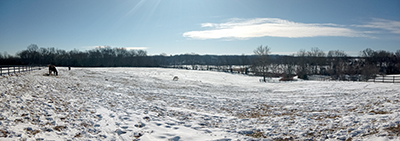
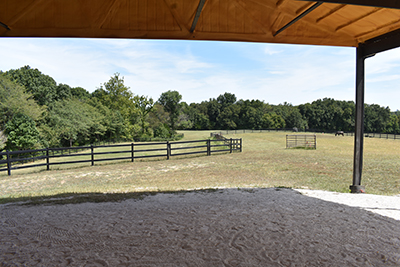
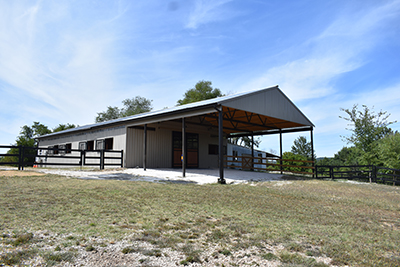
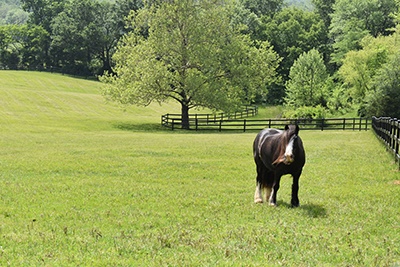
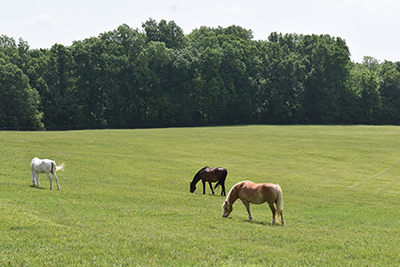
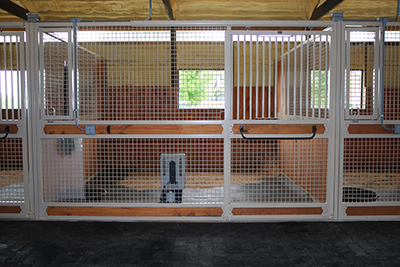
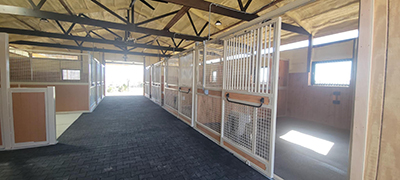
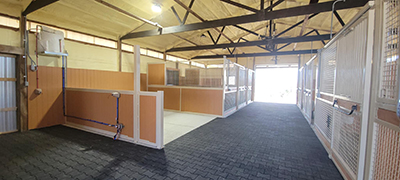
Are the organization's rules, restrictions and warnings (signage) conspicuously posted in easily accessible locations? Yes
Are the organization's emergency contacts, including veterinarian contact information, conspicuously posted in easily accessible locations? Yes
Are human and equine first aid kits easily accessible? Yes
Regarding all shelters where horses are housed including run-in sheds:
Do horses have assigned stalls in the barn/structure(s) or exclusively assigned shelter locations where they are separated from other horses with a barrier? Yes
How many hours per day, on average, are horses stalled or restricted to these sheltered exclusive shelter locations? 9-12
How often are the stalls/shelters cleaned, i.e., kept in good repair and free of standing water, accumulated waste, sharp objects and debris? 6-7 Days a Week
Do all stalls/shelters allow horses to lie down, stand up and turn around and provide protection from inclement weather (wind, sleet, rain, snow and extreme temperatures)? Yes
Are stalls/shelters kept in good repair, with adequate ceiling height, and free of standing water, accumulated waste, sharp objects and debris? Yes
Are floors constructed and maintained for both good drainage and traction? Yes
Is there a ventilation and circulation system in place to allow free flow of air to control temperature, and humidity, and to prevent air stagnation? Yes
Is wiring inaccessible to horses and maintained for safety in all areas of facility? Yes
Are fire prevention/protection measures (fire alarms, extinguishers and sprinkler systems) maintained and in good working order? Yes
Is there adequate lighting to ensure safety in all areas of facility? Yes
How many hours per day, on average, are horses turned out:
Equines are out 9 to 15 hours per day
The following describes the pastures at this facility:
This facility has a written plan in place for pasture management, which includes guidelines for seeding, fertilizing, irrigation, mowing, dragging, harrowing, manure removal, removal of debris, the control of poisonous plants, and a schedule for cleaning
A dedicated staff person(s) is responsible for pasture management
All pastures are fenced to prevent escape or injury
Fencing checks, such as broken or missing planks, loose fence posts, exposed or loose nails, detached wires, etc., are done regularly
Pastures have natural protection for equines (i.e., trees)
This facility does not have pastures where equines can graze on pasture grass
Barbed wire is used for fencing
Electric fencing is used; electric wires or tape fence are visibly marked
Pastures are rotated
Pastures have man-made protection for equines (i.e., shelters)
The following describes the turnout areas other than pastures at this facility:
This facility has a written plan in place for the maintenance of turnout areas, which includes a schedule for cleaning, manure removal, and dragging
A dedicated staff person(s) is responsible for the maintenance of turnout areas
All turnout areas are fenced to prevent escape or injury
Turnout areas have man-made protection for equines (i.e., shelters)
Fencing checks, such as broken or missing planks, loose fence posts, exposed or loose nails, detached wires, etc., are done regularly
This facility does not have turnout areas
Barbed wire is used for fencing
Electric fencing is used; electric wires or tape fence are visibly marked
The following policies and procedures are in place at the facility to restrict public access and to keep horses safe:
The property owner, staff member or caretaker lives on the premises and ensures that public access is restricted and is responsible for the security of the facility and equines
There is a mechanism in place to monitor equines overnight
By Appointment Only signs are posted.
Hold Harmless signs are posted
Authorized Personnel Only signs are posted
Visitors are only permitted at specific times
Visitors are only permitted in specific areas
A security guard is present at night
No Trespassing signs are posted
Entrance gates are locked at night
The property is fitted with motion lights
The property is fitted with a security system monitored by police or a professional service
The property is fitted with a security system that is monitored internally by staff (or the property owner)
The perimeter of the property is fully fenced
Equine Care/Emergency Preparedness: Ride On St. Louis, Forever Home (*Main) 2026 only This section is required.
Horse Health Care/Barn Management Records: What system is used to collect and store health/horse care records?
Notebook or equivalent (technology not utilized)
Onsite computer with onsite backup storage system
The organization utilizes its own system to maintain records
The following items are consistent with our feed management plan and practices:
Equines are provided with individualized feeding plans, including supplements, according to the equine's age, breed/type, condition, size, work level and any health issues, consisting of nutritious food provided in sufficient quantity and access to adequate natural forage, or be fed daily, or as recommended by the organization's veterinarian
Feed plans are determined in consultation with a veterinarian
Equines are fed grain in individual stalls
Staff and/or volunteers are trained in proper feed measurements and protocols and observed periodically to ensure they are feeding correctly
The feed chart is centrally located and updated as needed
The area(s) where hay, feed, grain, and supplements are stored are kept clean, free of debris and chemicals, and protected from weather and other animals in rodent-proof and mold-proof containers and grain bins
Feed, supplements and hay types are clearly labeled
Water sources, i.e., buckets, troughs, automatic waterers, etc. are kept clean, free of contaminants, debris and chemicals, protected from weather and other animals, and be positioned or affixed to minimize spillage.
Medications are kept in a secure area
Supplement plans are determined in consultation with a veterinarian
Equines are fed grain in groups
Is clean, potable water available at all times for all equines? Yes
Hoof Care: How often is hoof care provided for each equine? Every 4-8 weeks and when an issue arises
Dental Care: How often is dental care provided for each equine? Annually and when an issue arises
Horse checks: How often are equines visually and physically checked by personnel at the facility? Every day or 6 days a week
Our organization has the following parasite and fly/insect control protocols in place, including remedies used to control flies and insects:
Our organization follows the parasite control guidelines of our veterinarian, including fecal testing and de-worming
Fly/Insect Control Remedies:
Fly parasites
Feed Through Products
Fly Spray Repellent
Fly Masks
Fly Sheets
Fans
The following represent the biosecurity practices in place at facility:
Our organization follows the biosecurity guidelines of our veterinarian
Sick, affected and/or quarantined equines do not have contact with other equines or other animals
The organization has a written biosecurity plan
Staff are trained in best practices related to biosecurity
Volunteers are trained in best practices related to biosecurity
A specific individual is trained and assigned to care for sick, affected and/or quarantined equines
Sick, affected and/or quarantined equines are cared for last if the caretaker must also care for healthy equines
Hand sanitizers are available at all primary points of access to sick, affected and/or quarantined equines
Manure and bedding from sick, affected and/or quarantined equines is removed from the facility - not put in open air piles, and not spread on pastures
Quarantine areas, such as stalls, aisle ways, paddocks, and common areas, are cleaned (and needed, disinfected) after conclusion of the quarantine.
Trailers/vans used by sick, affected and/or quarantined equines are cleaned and disinfected after each use and cleaning takes place away from where equines are sheltered
Equipment used by sick, affected and/or quarantined equines is cleaned of organic debris and disinfected after each use
Latex gloves, or equivalent gloves, are worn when working with sick, affected and/or quarantined equines
Restricted access signs are posted at primary points of access to sick, affected and/or quarantined equines
Footbaths are available at all primary points of access to sick, affected and/or quarantined equines
Equipment used by sick, affected and/or quarantined equines is not shared
Equines are not quarantined on arrival.
Additional information on biosecurity:
Ride On St. Louis maintains a closed herd: No outside horses are allowed on the property unless undergoing quarantine procedures and are properly vetted. Thorough cleaning and disinfection of surfaces, equipment, and stalls/barn is performed regularly and outlined in our written daily maintenance and biosecurity plan. Hand sanitizers are available at the barn entrance and at the (feed and tool) storage entrance off the barn.
The following represent the manure removal practices in place at facility:
Manure is piled in an area where equines are not located
Manure is hauled, sold or given away
Manure piles are composted or spread on pastures
Our organization adheres to the manure management guidelines set by the state, local authorities, and/or our organization's veterinarian
Manure is stored in dumpster(s)
Manure piles are covered
The following steps are taken to help staff and volunteers readily identify each horse on the property:
Equines are assigned the same exclusive stall/shelter location each day
Equines wear halters with nametags
A notebook or binder with photos and information on each equine is easily accessible
A map/diagram is posted showing the location of each equine with equine names and photos
Equine photos and profiles are available on the website
Staff and volunteers are provided with an information packet with equine profiles, including photos and detailed descriptions
Staff/volunteers are provided training on conformation, markings, colors, and breeds
Team leaders work with new staff/volunteers until they are able to identify the equines
Name plates are located on the stall/shelter location
Photos are located on the stall/shelter location
Our organization has the following policies and procedures in place pertaining to tack, apparel and equipment:
All equines have specifically assigned apparel, equipment and tack (saddles/bridles if ridden) that is not shared
Saddles are shared
Blankets, sheets and turn out apparel are fitted and utilized for each equine appropriate to the equine's needs and the weather conditions
Blankets, sheets and turn out apparel are cleaned regularly as needed
Riding Tack is always cleaned after each use
Riding Tack is inspected for overall working condition before each use by trained personnel
Riding Tack is assessed for fit before each use by trained personnel
Riding Tack is assessed for fit by trained personnel when an equine's body condition changes
Riding Tack is assessed for fit by trained personnel when an equine's disposition changes
Assigned riding tack is clearly labeled
Helmets are cleaned/disinfected after each use
Saddle pads are shared
Bridles are shared
Bits are shared
Blankets are shared
Sheets are shared
Turnout apparel is shared
Halters are shared
Riding Tack is always cleaned at least weekly
Riding Tack is cleaned only when needed
This facility enlists the services of a professional saddle fitter at least once a year
Riding Tack is stored in a climate-controlled location
Helmets are shared
Helmets are replaced after a fall
Helmets are replaced at least every five years.
No equines are ridden; saddles, bridles, etc. not applicable.
Emergency Preparedness: Ride On St. Louis, Forever Home: *Main This section is required.
The following plans, policies, and procedures are in place at the facility to handle emergencies and address weather related issues, fire safety procedures, and/or any additional hazardous scenarios the facility could potentially experience:
Emergency procedures are posted prominently
The facility owns or has access to a generator
The facility maintains at least two weeks of hay, feed, shavings and medications
The facility collects and maintains medical information from staff, volunteers, and clients
The facility maintains appropriate liability and/or workers' compensation insurance
The organization has a written emergency preparedness/safety plan (EPP)
Local fire department and/or the state's emergency planning department procedures
Medical emergencies for clients, staff, and volunteers
Medical emergencies for equines
Evacuation plans
Power outages
Fire
Natural Disasters - thunderstorm, hurricanes, earthquakes, tornados, etc
Terrorist attacks
Protocols to notify emergency personnel
Building/facility exit plans
The facility follows the specific procedures to help PREVENT emergency situations:
Smoking is strictly prohibited
NO SMOKING signs are posted prominently
Permanent or temporary structures where equines are stalled are kept free of dust, cobwebs, trash, cleaning rags, and other flammable items
Aisles and doorways are kept clear
Heaters with automatic shutoff settings are used
Hay is stored away from permanent or temporary structures where equines are stalled
How often are the following checked or performed?
Fire Extinguishers are checked: Annually
Smoke detectors are checked: Annually
Fence lines are checked: Daily
Turnout Areas are checked: Daily
Sprinkler systems are checked: Not at all/NA
Fire drills are conducted: Semi-annually
Review of safety protocols with staff are conducted: Semi-annually
Review of safety protocols with volunteers are conducted: Semi-annually
The Emergency Preparedness Plan is reviewed and updated: Annually
Equine Transportation: 6= Onsite: 1 (1 + 0) + Offsite: 5
2-horse van/trailer with truck:
3 Access offsite;
3-horse van/trailer with truck:
1 Owned onsite 2 Access offsite;
© Copyright 2018 EQUUS Foundation 206 3.00